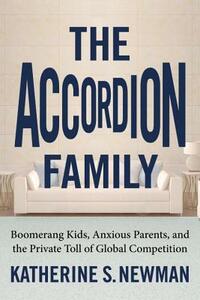You need to sign in or sign up before continuing.
Take a photo of a barcode or cover
4 reviews for:
The Accordion Family: Boomerang Kids, Anxious Parents, and the Private Toll of Global Competition
Katherine S. Newman
4 reviews for:
The Accordion Family: Boomerang Kids, Anxious Parents, and the Private Toll of Global Competition
Katherine S. Newman
A book about different countries' experience of adult children living with their parents in cultures where it isn't common. Includes European countries, Japan, US, etc. They touched on how the experience of financially stable families would come with different expectations than less secure families, but it was strange the adult children interviewed all agreed they didn't equally do chores in the house as their parents. It's standard for boomerang adults to act like equal housemates for the chore burden. At least buy cleaning robots if you won't chip in like an adult yourself.
The is a cross country disccussion and analysis of how globalization has lead to the increase in "boomerang kids" and "accordian families" wherein adult children live with their parents and delay marriage and starting their own families. The most interesting part is how the countries culture frame this phenomenon. In Japan it is met with recrimination and the assumption of poor parenting; in Spain it is clearly the economy and government failing families and the youth, and in the U.S. it is accepted as part of change and allowed if the adult child is working and trying to make leeway in other aspects of his/her professional life.
The author devotes a chapter to the Nordic countries of Northern Europe. Their liberal social democracies heavily subsidize education and housing so at 18 most young people can live on their own. It is the most interesting chapter because some people see this independence as a sign that family bonds are weak and generations are too isolated.
I learned lots of new things about every country (Japan didn't get the Pill until 199 or that the rental market in Spain is non-existant). I like that their was some discussion of class in relation to the U.S. and how poorer families depended on the income of multiple adults and adult children rarely move out until later. I admit I skimmed the chapter of declining birth rates and the needed yet feared and decried immigration rates.
If you liked Moneyball, but wished it was more academic and used more facts, this book is an excellent complement on how the economy and recession is lived.
The author devotes a chapter to the Nordic countries of Northern Europe. Their liberal social democracies heavily subsidize education and housing so at 18 most young people can live on their own. It is the most interesting chapter because some people see this independence as a sign that family bonds are weak and generations are too isolated.
I learned lots of new things about every country (Japan didn't get the Pill until 199 or that the rental market in Spain is non-existant). I like that their was some discussion of class in relation to the U.S. and how poorer families depended on the income of multiple adults and adult children rarely move out until later. I admit I skimmed the chapter of declining birth rates and the needed yet feared and decried immigration rates.
If you liked Moneyball, but wished it was more academic and used more facts, this book is an excellent complement on how the economy and recession is lived.
In a sociological study of families in the US, Italy and Japan, Newman tracks the effect of parents caring for, housing and financially supporting both their parents and children. Interestingly, upper class and working class families have continued to do this as a matter of course or of economic necessity, but for 200 years, the middle class has increasingly defined itself by the ease with which their children establish separate, independent nuclear households and tailored their parenting and values to those ends (tolerating teenage rebellion as a sign of independence, encouraging individuality). The global recession has turned that on its head, pushing together generations of people who never learned to live together and creating conflicts that people on the other ends of the social spectrum accept resentfully or smooth over because of ingrained culture.
challenging
informative
reflective
slow-paced
Very informative and eye opening, but could have wrapped up the data citations in half as many words

